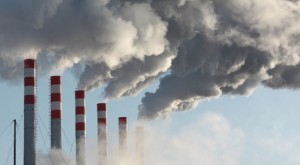Carbon Dioxide Pollution Reaches 'Troubling New Milestone' --- 400 PPM Over The Arctic
 The world’s air has reached what scientists call a troubling new milestone for carbon dioxide, the main global warming pollutant. Monitoring stations across the Arctic this spring are measuring more than 400 parts per million of the heat-trapping gas in the atmosphere. The number isn’t quite a surprise, because it’s been rising at an accelerating pace. Years ago, it passed the 350 ppm mark that many scientists say is the highest safe level for carbon dioxide. It now stands globally at 395. [Washington Post]
The world’s air has reached what scientists call a troubling new milestone for carbon dioxide, the main global warming pollutant. Monitoring stations across the Arctic this spring are measuring more than 400 parts per million of the heat-trapping gas in the atmosphere. The number isn’t quite a surprise, because it’s been rising at an accelerating pace. Years ago, it passed the 350 ppm mark that many scientists say is the highest safe level for carbon dioxide. It now stands globally at 395. [Washington Post] It’s been at least 800,000 years — probably more — since Earth saw carbon dioxide levels in the 400s….
Readings are coming in at 400 and higher all over the Arctic. They’ve been recorded in Alaska, Greenland, Norway, Iceland and even Mongolia. But levels change with the seasons and will drop a bit in the summer, when plants suck up carbon dioxide, NOAA scientists said.
“It’s an important threshold,” said Carnegie Institution ecologist Chris Field, a scientist who helps lead the Nobel Prize-winning Intergovernmental Panel on Climate Change. “It is an indication that we’re in a different world.”
Related Post:
•Science: CO2 levels haven’t been this high for 15 million years, when it was 5° to 10°F warmer and seas were 75 to 120 feet higher — “We have shown that this dramatic rise in sea level is associated with an increase in CO2 levels of about 100 ppm.”
An international coalition of nearly 100 people protested outside the Chevron shareholders’ meeting Wednesday in San Ramon. They claim the company is engaging in risky and dangerous operations overseas. [ABC]
My argument is that the same general principles that lead libertarians and conservatives to call for greater protection of property rights should lead them to call for greater attention to the most likely effects of climate change. Libertarians readily accept this principle when government planners violate property rights in the name of economic development (see e.g., Kelo v. New London). Yet they seem to abandon their commitment to property rights when it comes to global warming. [The Atlantic]
In the three years since President Barack Obama took office, Republicans have made the Environmental Protection Agency a lightning rod for complaints that his administration has been too tough on oil and gas producers. But an Associated Press analysis of enforcement data over the past decade finds that’s not the case. In fact, the EPA went after producers more often in the years of Republican President George W. Bush, a former Texas oilman, than under Obama. [AP]
American Electric Power conceded defeat on Wednesday, at least temporarily, in its push to save Big Sandy, its 49-year-old coal-burning plant in eastern Kentucky, surprising state officials there by withdrawing its $1 billion plan to retrofit the power plant so that it can meet tough new federal environmental regulations. [NYT]
A massive wildfire that has burned more than 265 square miles in the Gila National Forest has become the largest fire in New Mexico history, fire officials confirmed Wednesday.
The erratic blaze grew overnight to more than 170,000 acres, surpassing a blaze last year that burned 156,593 acres in Los Conchas and threatened the Los Alamos National Laboratory, the nation’s premier nuclear facility. [WSJ]
You can return to the main Market News page, or press the Back button on your browser.

